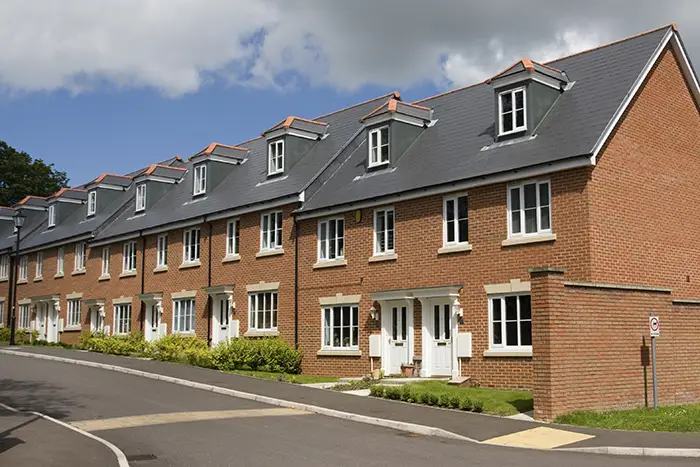
See if you pre-qualify for a mortgage
Enquire about a mortgage with our pre-qualifying affordability form. No imprint on your credit score.
Will not affect credit score
Residential mortgage
A residential mortgage in the UK is a loan that is used to purchase a property for use as a primary residence. The lender, typically a bank or building society, uses the property as collateral for the loan. The borrower makes monthly payments to the lender until the loan is fully repaid, which is typically over a period of 25-40 years.
Mortgage application process
4 simple steps for applying for a mortgage. See more about the mortgage application process here
Complete our
pre-qualify form
Let us know a few details about the mortgage you require
A mortgage specialist will call
One of our brokers will call and get a few more details of your requirements
We search for your perfect mortgage
We will search the market for the best rates for your circumstances
A Decision in Principle is made
We will secure a DIP with a lender, if you approve we move forward with a full application.
Whatever your mortgage goal, there will be something for you

We're on a mission to save you money on your mortgage
- Over 100 lenders
- Personalised Advice Service
- 1000s of products and access to exclusive rates
- Tailored recommendations to your individual needs
- We do the application on your behalf
- Secure Online Portal for document upload
- We liaise with all parties on your behalf
- Helping you even where others have said no
- Excellent Reviews
Arrange a callback
Use our free mortgage form to see what you could potentially borrow and monthly payments. *
*Mortgage borrowing is intended to be a guide based on the amount of deposit entered and your income details. A mortgage adviser will fully assess your requirements before making a mortgage recommendation.
By submitting your details you agree to them being used by Clever Mortgages to respond to your mortgage enquiry.
A residential mortgage for a property you live in is one of the most common forms of credit in the UK
Residential mortgage is one of the most common mortgages, whether you’re a first-time buyer, or are looking to move house, a residential mortgage or home mover mortgage as its sometimes called will most likely be the type of loan that you’re looking for.
A residential mortgage in the UK is a loan that is used to purchase a property for use as a primary residence. The lender, typically a bank or building society, uses the property as collateral for the loan.
The borrower makes monthly payments to the lender until the loan is fully repaid, which is typically over a period of 25-40 years. The interest rate on a residential mortgage in the UK can be fixed or variable, and the terms of the loan may vary depending on the lender and the borrower’s creditworthiness.
When a house is bought it is common for a cash deposit to be put down. This is typically (although not always) at least 5% of the property price. The loan is then used to pay the rest of the purchase price and potentially any extra that has been borrowed to cover, for example renovation or improvement costs.
How does a Residential Mortgages work?
A residential mortgage works by using a property as collateral for a loan. The borrower, usually a home buyer, borrows a certain amount of money from a lender, typically a bank or building society, to purchase a property. The lender then holds a legal claim to the property until the loan is fully repaid, which is typically over a period of 25-30 years.
The borrower is required to make regular payments to the lender, which typically include both the principal (the original amount borrowed) and the interest (the cost of borrowing the money). The interest rate on a mortgage can be fixed or variable, and the terms of the loan may vary depending on the lender and the borrower’s creditworthiness.
The lender also has the right to foreclose on the property if the borrower fails to make the required payments, which means they can take possession of the property and sell it to repay the outstanding loan.
Overall, a mortgage is a way for individuals to purchase a property by borrowing money and paying it back over time, while the lender uses the property as collateral to secure the loan.
Residential Mortgage FAQ
We have answered all your questions hopefully, but if there is anything you still need to know, please call us on 0330 232 0285
Can anybody get a mortgage?
Not everyone can qualify for a mortgage. Lenders use strict criteria to determine who they will lend money to, and the requirements can vary depending on the type of mortgage and the lender.
Some of the factors that lenders typically consider when assessing a mortgage application include:
- Credit score: Lenders will look at the borrower’s credit score and credit history to assess their creditworthiness. A good credit score can improve the chances of being approved for a mortgage and getting better terms.
- Income: Lenders will want to see proof of the borrower’s income, such as payslips, tax returns, and bank statements, to determine whether they can afford the monthly mortgage payments.
- Employment history: Lenders will want to see that the borrower has a stable employment history, as they will be more likely to repay the loan if they have a steady income.
- Deposit: Lenders will typically require the borrower to have a certain amount of money saved as a deposit, which can range from 5% to 25% or more of the property’s value.
- Property type and location: Lenders may have different requirements for different types of properties, such as new-builds or flats, and may also take into account the location of the property when assessing the application.
- Affordability: Lenders will check if the borrower will be able to afford the mortgage repayments, taking into account the borrower’s income, expenses, and the interest rate.
It’s important to note that not everyone will meet all of these requirements, and some people may have difficulty getting approved for a mortgage due to poor credit, lack of income, or lack of a deposit.
However, there are government schemes such as Help to Buy or Shared Ownership that can assist people in these situations to be able to secure a mortgage.
Our brokers at Clever mortgages also specialise in helping people with bad or poor credit. We know lenders that work with people who in the past have had the misfortune to have had trouble in the past.
What is a residential mortgage?
Whether you’re a first-time buyer or looking to move house, a residential mortgage is the type of mortgage you will need to take out. A residential mortgage is a mortgage for a house that you live in. It is a long term loan which helps to fund the purchase of a property. The mortgage is to be paid back to the lender over approximately 25 years or more with additional interest.
With this type of mortgage, you must be living in the home yourself. You cannot rent the house out to tenants or use the property for any commercial purpose.
Residential mortgages typically require a cash deposit of between 5% and 25%+ of the total property value. For example, the deposit you would require for a £200,000 home would be somewhere within the region of £10,000 and £50,000.
What is a loan to value ratio (LTV)
Every mortgage has an LTV ratio. This is the amount you borrow set against the total value of the property.
If you are looking at buying a house with a value of £200,000 and you have a deposit of £40,000, then you will need to borrow £160,000 to afford the property. This would give you an 80% LTV mortgage with your deposit making up the remaining 20%.
The lower the ratio, the lower the risk to the lender and the better the interest rate you will be eligible for.
Mortgage Rates
Mortgages with the lowest available interest rates typically have an LTV of 60%. The highest rate mortgages typically have an LTV of 85% or more. Higher loan to value mortgages are popular options for people buying their first home as it allows them to save less for a deposit and get onto the property ladder much quicker than they would otherwise.
Credit Rating
As well as your deposit amount, lenders will also consider your individual financial circumstances when applying for a mortgage. Your credit rating plays a huge role in your mortgage application. If you have a poor credit rating then it’s likely you will only be eligible for mortgages with high-interest rates. You can find out more about our bad credit mortgage options here.
What is the Mortgage Process?
The mortgage process typically involves several steps and can take several weeks to complete. Here is an overview of the main steps involved in the mortgage process:
- Mortgage Decision in Principle: Before you start looking for a property, it’s a good idea to get pre-approved for a mortgage. This means that a lender has reviewed your financial information and determined how much they are willing to lend you. This can help you narrow your search to properties that you can afford and can make you a more attractive candidate to sellers.
- Finding a property: Once you have pre-approval, you can start looking for a property to purchase. When you find a property that you want to buy, you will make an offer, which the seller may accept, reject, or counter.
- Mortgage Application: Once the seller accepts your off, you’ll need to apply for the mortgage. The lender will review all of your financial information, including your credit score, income and out goings to determine whether you qualify for the mortgage and what terms to offer.
- Property Valuation: As part of the mortgage application process the lender will order a valuation of the property to determine its value. This is done to ensure that the property is worth at least as much as the mortgage you are requesting.
- Mortgage Offer: Once the lender has approved your loan, you will need to close on the property. This typically involves signing a mortgage agreement and transferring the funds from the lender to the seller.
- Completion: After completing you are officially a homeowner and will have to start making payments on your mortgage.
Please note that the process may vary by lender, but the above are the general steps involved in a mortgage process.
What does fixed vs. variable mean on a mortgage?
When it comes to mortgages, fixed vs. variable refers to the type of interest rate that is applied to the loan.
A fixed-rate mortgage is a loan where the interest rate remains the same for the entire term of the loan, typically 2, 3, or 5 years. This means that the borrower will know exactly how much their monthly payments will be for the duration of the fixed-rate period and it can provide stability and predictability for borrowers.
However, a fixed-rate mortgage means that the borrower may miss out on lower interest rates if the market rate drops.
A variable-rate mortgage, on the other hand, is a loan where the interest rate can change at any time, according to the lender’s discretion. The interest rate is typically linked to an benchmark rate such as the Bank of England base rate or lender’s Standard Variable Rate (SVR).
This means that the interest rate on the loan will change in line with the benchmark rate. Variable-rate mortgages can be more flexible than fixed-rate mortgages, but they also come with more risk, as the interest rate can fluctuate and make the monthly payments more expensive.
It’s important to consider which type of interest rate is best for your situation. If you prefer the stability and predictability of fixed payments, a fixed-rate mortgage may be the best choice.
But, if you’re willing to take on the risk of potentially higher payments in exchange for the possibility of lower rates, a variable-rate mortgage may be a better option.
What Types of Mortgages are there UK?
There are several types of mortgages available in the UK, each with its own set of features and requirements. Some of the most common types of mortgages include:
- Fixed-rate mortgages: With a fixed-rate mortgage, the interest rate remains the same for the entire term of the loan, typically 2, 3, or 5 years. This can provide stability and predictability for borrowers, but it also means that the borrower may miss out on lower interest rates if the market rate drops.
- Tracker mortgages: Tracker mortgages have an interest rate that is linked to a benchmark rate, such as the Bank of England base rate. This means that the interest rate on the loan will change in line with the benchmark rate. Tracker mortgages can be more flexible than fixed-rate mortgages, but they also come with more risk, as the interest rate can fluctuate.
- Discounted mortgages: Discounted mortgages offer a discounted interest rate for a certain period, typically one to five years, after which the interest rate will revert to the lender’s standard variable rate. This can provide a lower interest rate in the short term, but the borrower may end up paying a higher rate in the long term.
- Standard variable-rate mortgages: Standard variable-rate mortgages have an interest rate that can change at any time, according to the lender’s discretion. This type of mortgage can provide flexibility, but the interest rate can also increase, making the monthly payments more expensive.
- Offset mortgages: An offset mortgage links a savings account or a current account to the mortgage account. The balance of these accounts is then offset against the outstanding mortgage balance, reducing the interest charged on the mortgage.
- Buy-to-let mortgages: These mortgages are designed for people who want to buy a property to rent out to tenants. They often have higher deposit requirements and interest rates than standard residential mortgages.
- Shared Ownership Mortgages: Shared ownership mortgages are for people who can’t afford to buy a home outright and want to buy a share of a property and pay rent on the remaining share.
- Help to Buy Mortgages: Help to Buy mortgages are designed to help first-time buyers and home movers purchase a home with a small deposit.
Keep in mind that each type of mortgage has different features, benefits and drawbacks, so it’s important to research and compare different options and choose one that best fits your needs and financial situation. Or speak to our brokers at Clever Mortgages for an informal chat.
How can I get a mortgage?
Getting a mortgage can be a complex process, but here are the general steps you can take to apply for a mortgage, a mortgage advisor such as our team can make this process very simple:
- Prepare your financial information: Gather all the necessary documents to prove your income, such as pay slips, tax returns, and bank statements. You’ll also need to provide information about your debts, assets, and credit score.
- Check your credit score: Review your credit score to see if there are any errors or issues that may affect your ability to get a mortgage.
- Determine how much you can afford: Use a mortgage affordability calculator to estimate how much you can afford to borrow, and what your monthly payments would be.
- Shop around: Compare different mortgage products and offers from different lenders to find the best terms for your situation.
You can also use a mortgage broker to help you find the best deals, call us on 0330 232 0285. - Submit your application: Once you’ve found a mortgage that you want to apply for, submit your application to the lender. The lender will then review your application and financial information to determine whether you qualify for the loan and what terms to offer.
- Property Valuation: As part of the mortgage application process the lender will order a valuation of the property to determine its value. This is done to ensure that the property is worth at least as much as the mortgage you are requesting.
- Complete on the property: Once the valuation is complete, and the loan is approved, you will need to complete on the property. This typically involves signing a mortgage agreement and transferring the funds from the lender to the seller. This is usually done via a solicitor.
- Make payments: After the completion, you are officially a homeowner and will have to start making payments on your mortgage.
It’s important to keep in mind that the mortgage process can take several weeks, and the requirements and process may vary depending on the lender and jurisdiction. However, by following these general steps and working with a lender or mortgage broker, you can increase your chances of getting approved and secure a mortgage that best fits your needs.
How can I improve my chances of getting a mortgage?
There are several steps you can take to improve your chances of getting approved for a mortgage:
- Improve your credit score: Your credit score is one of the most important factors that lenders consider when assessing a mortgage application. If your credit score is low, take steps to improve it by paying your bills on time, reducing your credit card balances, and disputing any errors on your credit report.
- Build up your savings: Lenders will want to see that you have enough money saved for a deposit, which can range from 5% to 25% or more of the property’s value. The more you have saved, the better your chances of getting approved for a mortgage.
- Get pre-approved: Before you start looking for a property, consider getting pre-approved for a mortgage. This means that a lender has reviewed your financial information and determined how much they are willing to lend you. This can help you narrow your search to properties that you can afford and can make you a more attractive candidate to sellers.
- Demonstrate stable employment and income: Lenders will want to see that you have a stable employment history and income, as they will be more likely to repay the loan if you have a steady income.
- Shop around: Compare different mortgage products and offers from different lenders to find the best terms for your situation.
- Look into government schemes such as Shared Ownership: Government schemes can assist people who can’t afford the deposit for a mortgage, so it’s worth looking into these options.
- Get a mortgage broker: A mortgage broker can help you find the best mortgage deals and guide you through the application process, which can increase your chances of getting approved.
It’s important to remember that even if you meet all the criteria, there is no guarantee that you will be approved for a mortgage. However, by taking the above steps, you can improve your chances of getting approved and secure a mortgage that best fits your needs.
How much deposit do you need for a mortgage UK?
The amount of deposit required for a mortgage in the UK can vary depending on several factors, including the type of mortgage, the lender, and the borrower’s creditworthiness.
Typically, borrowers will need to have a deposit of at least 5% of the property’s value to qualify for a mortgage. However, many lenders will require a deposit of 10% to 25% or more, especially if the borrower has a poor credit score or limited income.
The higher the deposit, the lower the risk for the lender, and the better the interest rate offered to the borrower. With a higher deposit, you will also be able to access a wider range of mortgage products and get better terms.
It’s worth noting that there are government schemes such as Help to Buy and Shared Ownership that can assist people who can’t afford the deposit for a mortgage.
Shared Ownership
You buy a share of a home (between 25% and 75% of the home’s value) and pay rent on the remaining share. You’ll need a smaller deposit because you’re only buying a share of the home.
It’s important to note that the deposit requirements are subject to change and can vary depending on the lender, so it’s best to check with different lenders and compare their offers to find the best mortgage for your situation.
What is a mortgage calculator?
A mortgage calculator is a tool that can help you estimate your monthly mortgage payments, based on the loan amount, interest rate, and the term of the loan. It is a simple online tool that allows you to input different variables and see the effect on your monthly payments.
Mortgage calculators can help you get a better understanding of the costs associated with a mortgage, such as the monthly payments, the total interest paid over the life of the loan, and the total cost of the loan.
Mortgage calculators can be used to:
- Estimate your monthly payments for a given loan amount and interest rate.
- Compare the costs of different mortgages with different interest rates and loan terms.
- Determine the impact of making extra payments or paying points on your mortgage.
- Estimate the costs of different loan types, such as fixed-rate mortgages and adjustable-rate mortgages.
It’s worth noting that mortgage calculators are estimates only and are not a guarantee of the actual mortgage rate or payment you will receive. The calculations are based on the information that you input and the assumptions made by the calculator. Some calculators can be more detailed and provide more accurate estimates than others.
It’s important to use a mortgage calculator as a starting point and not rely solely on the results, as it’s a tool that can help you understand how different variables affect your mortgage payments, but it can’t replace the expertise of a mortgage lender or broker.
What does a mortgage broker do?
A mortgage broker is a professional who helps borrowers find and apply for a mortgage loan. They work with a variety of lenders and can offer a wide range of mortgage products and options, which can save borrowers time and money. Here are some of the main responsibilities of a mortgage broker:
- Assessing the borrower’s needs and financial situation: A mortgage broker will review the borrower’s income, credit score, debts, and assets to determine what type of loan and terms they can qualify for.
- Shopping around for the best deals: A mortgage broker has access to a wide range of mortgage products from different lenders and can help borrowers compare rates, fees, and terms to find the best deals, and usually only one application.
- Helping the borrower complete the application: A mortgage broker can assist borrowers in completing the mortgage application, including gathering and submitting all the necessary documents.
- Communicating with the lender: A mortgage broker will act as the intermediary between the borrower and the lender, communicating with the lender on the borrower’s behalf throughout the application process.
- Advising the borrower: A mortgage broker can provide advice and guidance to the borrower throughout the mortgage process, including explaining the different types of mortgages, the terms and conditions, and the pros and cons of different options.
- Helping after the closing: Some mortgage brokers will also help the borrower with the closing process and provide ongoing support after the closing, such as helping the borrower refinance their loan or find ways to lower their monthly payments.
It’s important to keep in mind that the mortgage broker may charge a fee for their service, but can save borrowers time and money by finding the best mortgage deals and guiding them through the application process.
What is a mortgage rate?
A mortgage rate is the interest rate that is applied to a mortgage loan. It is the cost of borrowing the money from the lender, expressed as a percentage of the loan amount. The mortgage rate determines the amount of interest that the borrower will have to pay over the life of the loan, in addition to the principal amount borrowed.
Mortgage rates can vary depending on several factors, including the type of loan, the term of the loan, the lender, and the borrower’s creditworthiness. Some of the most common types of mortgage rates include:
- Fixed-rate mortgages: These have an interest rate that remains the same for the entire term of the loan, typically 2, 3, or 5 years.
- Variable-rate mortgages: These have an interest rate that is linked to an benchmark rate such as the Bank of England base rate.
The mortgage rate can have a significant impact on the overall cost of the loan and the monthly payments. A lower mortgage rate can mean lower monthly payments, while a higher mortgage rate can mean higher monthly payments.
It’s important to keep in mind that mortgage rates can change frequently and can vary depending on the lender and the individual borrower’s circumstances, so it’s important to compare rates and terms from different lenders before choosing a mortgage.
Should I find a house first or a apply for a mortgage?
Whether you should find a house or a mortgage first depends on your individual circumstances and priorities. Here are some factors to consider when making your decision:
- Pre-approval: If you are looking to purchase a home in the near future, it may be beneficial to get pre-approved for a mortgage first. This means that a lender has reviewed your financial information and determined how much they are willing to lend you. With a pre-approval, you will have a better idea of how much you can afford to spend on a home and can narrow your search to properties that fall within your budget.
- Market conditions: If you are purchasing a home in a competitive housing market, it may be more beneficial to find a home first. In a competitive market, homes may be selling quickly, and you may need to move quickly to make an offer on a home before it is sold to someone else.
- Government schemes: If you are looking to purchase a home through government schemes such as Shared Ownership, you may need to find a home first and then apply for the scheme.
- Resources: If you have the resources to do so, you can do both simultaneously, find a mortgage and a house. By doing so, you will have a better idea of how much you can afford to spend on a home, and you will be in a better position to make an offer when you find a home that you like.
Ultimately, the best approach for you will depend on your individual circumstances and priorities. It may be beneficial to speak with a mortgage broker or a real estate agent to help you make the best decision for your situation.
What is a prime mortgage?
A prime mortgage is a type of mortgage that is offered to borrowers with good credit scores and stable income. Prime mortgages typically have lower interest rates and more favourable terms than subprime mortgages, which are offered to borrowers with weaker credit and income.
Prime mortgages are considered to be less risky for lenders, as borrowers with good credit scores and stable income are considered to be more likely to repay the loan on time. As a result, lenders may offer lower interest rates and more flexible terms to borrowers who qualify for prime mortgages.
A prime mortgage can be of any type such as fixed-rate or variable-rate, depending on the lender and the borrower’s preference. In addition, prime mortgages can be offered to borrowers who want to purchase a primary residence, a second home or even for investment properties.
It’s worth noting that the criteria for being considered as a prime borrower can vary depending on the lender and market conditions, but generally, borrowers with a credit score of 700 or higher, low debt-to-income ratio and a stable income are considered prime borrowers.
What is a sub prime mortgage?
A subprime mortgage is a type of mortgage that is offered to borrowers with weaker credit scores and/or unstable income. Borrowers who qualify for subprime mortgages may not be able to qualify for prime mortgages due to a lower credit score, high debt-to-income ratio, or a lack of a credit history.
Subprime mortgages typically have higher interest rates and less favourable terms than prime mortgages, as they are considered to be higher risk for lenders. The higher interest rate is intended to compensate the lender for the added risk they are taking on by lending money to a borrower with weaker credit.
It’s worth noting that the criteria for being considered a subprime borrower can vary depending on the lender and market conditions, but generally, borrowers with a credit score below 620, high debt-to-income ratio and unstable income are considered subprime borrowers.
Can I get a mortgage on my own?
Yes, you can get a mortgage on your own, without the help of a co-borrower or guarantor. However, getting a mortgage as an individual can be more challenging than getting one with a co-borrower, as lenders typically look at the combined income, credit score, and debt-to-income ratio of all borrowers when assessing a mortgage application.
When you apply for a mortgage on your own, you will be solely responsible for repaying the loan and the lender will rely on your income, credit score and debt-to-income ratio when assessing your application. A higher income, good credit score and lower debt-to-income ratio can increase your chances of getting approved for a mortgage and getting better terms.
It’s worth noting that there are government schemes that can help you to get a mortgage on your own, such as Shared Ownership. These schemes can help to reduce the deposit required, and also help to increase the amount of mortgage you can qualify for.
It’s important to keep in mind that getting a mortgage on your own may be more challenging, but it’s not impossible. By preparing your financial information, shopping around for the best deals, and possibly looking into government schemes, you can increase your chances of getting approved for a mortgage.
Can I get a mortgage as a couple?
Yes, you can get a mortgage as a couple. When you apply for a mortgage as a couple, the lender will take into account the combined income, credit score, and debt-to-income ratio of both borrowers when assessing the application. Having two incomes and good credit scores can increase your chances of getting approved for a mortgage and getting better terms.
When applying for a mortgage as a couple, you will need to provide the lender with information about both of your incomes, credit scores, and debts. You will also need to decide how to hold the title to the property, whether as joint tenants or tenants in common.
It’s worth noting that having a co-borrower can increase your chances of getting approved for a mortgage and getting better terms, as the lender will have a better idea of your combined ability to repay the loan. However, it’s also important to consider that both of you will be jointly liable for the mortgage and if one of you fails to make the payments, it can affect both of your credit scores.
When applying for a mortgage as a couple, it’s important to consider your individual financial situations and credit scores, as well as your plans for the future. It’s also important to shop around and compare different offers from different lenders, to find the best mortgage terms for your situation.
How do I decide on the best route?
It is important before making a decision to consider the benefits and costs of each mortgage product. Clever mortgages take the time to understand your requirements and future plans to ensure you receive best advice tailored to your needs.
Complete the callback form and one of our experienced brokers will call you for a FREE no obligation chat
Watch our video on the mortgage application process
Below are some of the lenders we work with























